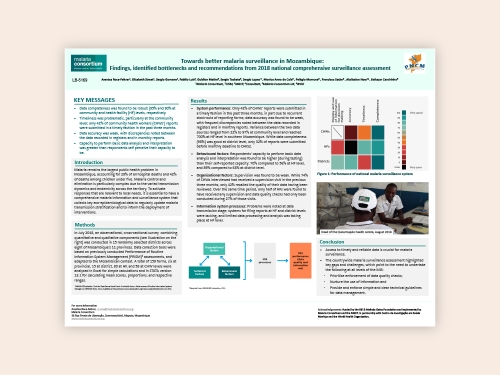
Publication Date:
29/10/2018
Author:
Arantxa Roca-Feltrer
Elizabeth Streat
Sergio Gomane
Fabiao Luis
Guidion Mathe
Sergio Tsabete
Sergio Lopes
Monica Annade Cola
Pelagio Marrune
Francisco Saute
Abdisalan Noor
Baltazar Candrinho
Type:
Poster

Towards better malaria surveillance in Mozambique: Findings, identified bottlenecks and recommendations from 2018 national comprehensive surveillance assessment
Publication Date:29/10/2018
Author:
Arantxa Roca-Feltrer
Elizabeth Streat
Sergio Gomane
Fabiao Luis
Guidion Mathe
Sergio Tsabete
Sergio Lopes
Monica Annade Cola
Pelagio Marrune
Francisco Saute
Abdisalan Noor
Baltazar Candrinho
Type:
Poster
Malaria remains the largest public health problem in Mozambique, accounting for 29 percent of all hospital deaths and 42 percent of deaths among children under five. Malaria control and elimination is particularly complex due to the varied transmission dynamics and endemicity across the country. To activate responses that are relevant to local needs, it is essential to have a comprehensive malaria information and surveillance system that collects key eco-epidemiological data to regularly update malaria transmission stratification and to inform the deployment of interventions.
This presentation, delivered at the 67th annual meeting of the American Society of Tropical Medicine and Hygiene, shares findings from Mozambique's 2018 national comprehensive surveillance assessment.
Country: Mozambique
Keywords: Surveillance | Evidence generation | Malaria | Quality improvement | SDGs
Diseases: Malaria
« Back to Publications